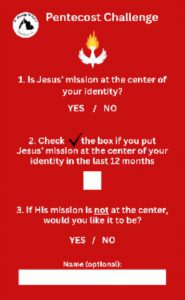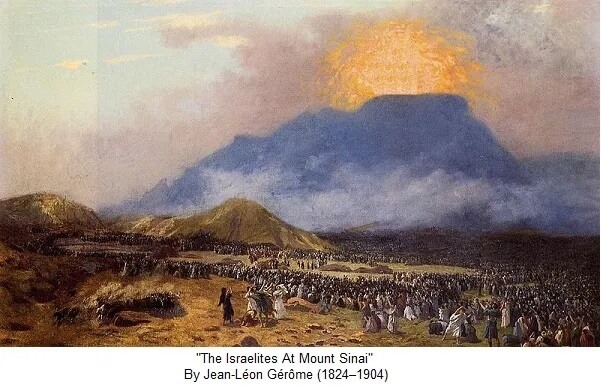As mentioned, today we’re doing our first Pentecost Challenge. Jesus says in the Gospel, “Peace be with you. As the Father has sent me, so I send you” (Jn 20:21). The Father sent Jesus on a mission of love to bring us home, and Jesus repeatedly sends those who love Him to bring others home. Where are we in relation to this mission of love? Doing this Challenge will help us know so that we can grow! As said, there’s no pressure to give a certain response; we’re just establishing a baseline. We saw the questions last week, and I thank everyone in advance for participating.
 So, here we go: Who here has placed Jesus’ mission at the center of their identity? Who made this choice for the first time in the past 12 months? And, if Jesus’ mission isn’t at the center, please put up your hand if you’d like it to be. Thank you! Praise God!
So, here we go: Who here has placed Jesus’ mission at the center of their identity? Who made this choice for the first time in the past 12 months? And, if Jesus’ mission isn’t at the center, please put up your hand if you’d like it to be. Thank you! Praise God!
Two years ago, I shared a story about identity. Dr. Peter Kreeft had a positive encounter with a man who described himself as a ‘homosexual Catholic.’ Kreeft recognized him as intelligent and so asked, ‘Could you tell me why many people in the LGBT movement don’t like the distinction between loving the sinner and hating the sin.’ The man answered: If people said they love Catholics but forbade them from celebrating Mass, would you feel threatened? Kreeft answered, ‘I would, because that’s my identity. Thank you. You taught me something.’ Then he asked, ‘You call yourself a homosexual Catholic—which of those is your deepest identity?’ The man smiled, ‘We both taught each other something today’ (Defending Marriage in a Post-Christian Culture, Track 13). What’s our deepest identity?
When we look at the First Reading, we see the Church’s identity is to be the family of all people: “When the day of Pentecost had come, they were all together in one place. And suddenly from heaven there came a sound like the rush of a violent wind, and it filled the entire house… Divided tongues, as of fire, appeared among them… All of them were filled with the Holy Spirit and began to speak in other languages, as the Spirit gave them ability” (Acts 2:1-4).
The signs of wind and fire remind us of the Old Testament event at Mount Sinai: The people were at the base of the mountain while God appeared in wind and fire and made a covenant with them, that is, He made them part of His family. This event took place roughly 50 days after He rescues them from slavery in Egypt.
Something similar happens 50 days after Jesus’ Resurrection, which rescues us from death: The Holy Spirit gives birth to the Church, which is God’s family.
The text continues: “Now there were devout Jews from every nation under heaven living in Jerusalem. And at this sound the crowd gathered and was bewildered, because each one heard them speaking in their own language [What God is doing is He’s uniting the human family, by enabling us to understand each other, whereas sin divides and causes misunderstandings]. Amazed and astonished, they asked… ‘How is it that we hear, each of us, in our own language? Parthians, Medes, Elamites, and residents of Mesopotamia, Judea and Cappadocia, Pontus and Asia, Phrygia and Pamphylia, Egypt and the parts of Libya belonging to Cyrene, and visitors from Rome, both Jews and converts, Cretans and Arabs — in our own languages we hear them speaking about God’s deeds of power’” (2:5-11).
This map shows the 16 cities or regions mentioned. It’s basically in every geographical direction.
God the Father is trying to rebuild the human family, not based on race, but on love. To enter this family, you don’t need to be a certain race; you need to believe in, trust, and love Him. He starts His family in Jerusalem, and this family is sent to reach estranged brothers and sisters. Those of us who are Catholic are part of this family because someone reached out to us (our parents or someone else). None of us was born part of this family.
Think how amazing this is. The human race is always divided, starting with families. Are there people in your family who aren’t talking to each other? Any separated or divorced? Many people in Alberta and Quebec want to separate from Canada. Countries and races often see themselves in opposition.
But the Church’s mission is to unite around Jesus, it’s our deepest identity. The word ‘Catholic’ means…? Universal. The principal agent of this unity is the Holy Spirit, because there’s no way humans could organize 1.2 billion Catholics in the 195 countries recognized by the United Nations.
I mentioned before that I’m grateful to be Chinese, Irish, Italian, and Austrian but they’re not my deepest identity. I’m more Canadian because I grew up here. But my deepest identity is that I’m a son of God. That identity explains two existential questions: Why I was created and what is my purpose? My four ethnicities and being Canadian are part of me but don’t answer fundamental questions. So, when we live this identity as being part of God’s family, we’re proud of our race and are patriotic, but never exclusive; we love other races and hope that everyone loves their country.
Who has heard the term ‘identity politics’? Wikipedia defines it as “politics based on a particular identity, such as ethnicity, race, nationality, religion, denomination, gender, sexual orientation,” etc. In our culture, many people are hyper-aware of these categories in the noble hope of standing up for people who are oppressed. But this leads to marginalizing other people. For example, in Canada, you can never make fun of a minority, but you’re allowed to make fun of white people; you should defend religions but, in practice, Christianity is rarely defended.
The Holy Spirit is able to overcome this. If any young adult has a chance of going to World Youth Day 2027 in South Korea, you’ll see different races and flags, hear different languages, but, according to the Catechism (815), four things unite Catholics: 1) charity (loving the way Jesus did, according to His commands); 2) the profession of faith (what we believe); 3) the Sacraments (how we pray); and 4) apostolic succession (our governance).
We have nothing about which to brag being part of God’s family. It humbles us because we’ve been given a gift, and we should celebrate what the Holy Spirit has done! In addition, we have a mission to extend Jesus’ family, to invite people home. It starts with our own family, by loving them as Christ does and helping them know Jesus. Then it extends to the whole world! To place Jesus’ mission at the center of identity is the best way to unite the world.
After the homily, would everyone please take 30 seconds to fill out the Pentecost Challenge cards? Thank you!
To conclude, in 2020, after returning from some weeks away, I observed that our parish had overall hit a plateau: We had grown spiritually, but many of us were tired, we weren’t as hungry to participate, and were mainly taking care of ourselves, that is, our spiritual well-being, our programs, our people. So, I knew we had to start discerning a new parish vision that would push us outwards, and two words were important: ‘overflow’ and ‘sent.’ God overflows with love and wants us to overflow with His love towards others.
The importance of the word ‘sent’ came from an image that a man shared, one that spoke to my heart and pushed me to help our parish be more outward focused: If our children were abducted, would we wait until an opportune time to look for them? No, this would be our one mission! This is why the Father searches for us, why He sends His Son and the Holy Spirit. When we see the world the way the Father does, that our brothers and sisters whom we love have been abducted by sin, then it’s at the deepest part of our identity to search for them. Let’s ponder this. It’s at the deepest part of Jesus’ identity to bring us home.



